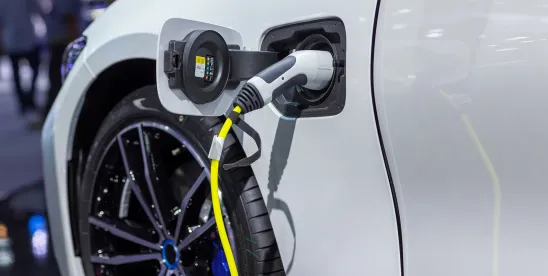Electric car sales in 2023 were 3.5 million higher than in 2022, a 35% increase in one year. The rise in demand for electric vehicles (“EVs”) has prompted many companies to enter the EV battery space. Given the rapid development of, and technological advances required to, create new EVs, innovators in this space are increasingly encountering trade secret theft. Trade secret litigation in the EV sector has, accordingly, increased in recent years. In March, a leading EV manufacture filed suit against two former employees who allegedly converted battery assembly trade secrets to a newly-created Chinese company.
The unsealed private complaint was filed in the Eastern District of New York: United States of America v. Pflugbeil, et al., No. 24 MJ 226. The alleged trade secret at-issue related to battery assembly, referred to as “continuous motion assembly,” allowed the company to run its assembly lines at a high rate. The complaint alleges the company spent $13 million in research and development of its battery assembly trade secret between 2004 and 2017. Despite taking measures to keep its battery assembly information secret, including by storing confidential diagrams on a controlled server, the defendant ex-employees were given access to that server during their employment with the company.
The complaint further alleges that the defendants conspired to create their own company selling battery assembly products in Canada and China. The defendants exchanged emails and text messages indicating confidential documents were taken from the company. They created a new, competing business in China, Canada, Germany, and Brazil and contacted their former company’s manufacturer to produce assembly parts based on confidential drawings allegedly stolen from their former company. The lawsuit remains pending.
Trade secret litigation, like this one, in the EV space has increased in recent years as companies vie to protect their confidential information. In 2020, Tesla sued its EV competitor, Rivian, in California state court alleging trade secret misappropriation after former Tesla employees began working for Rivian. And, in 2019, LG Chem filed a claim against SK Innovation at the International Trade Commission, alleging SK Innovation developed EV batteries using trade secrets brought over from former LG Chem employees. These companies have recognized the importance of protecting their confidential business practices and enforcing their intellectual property rights against competitors.
Trade secrets provide a valuable opportunity to protect important intellectual property, while also maintaining their confidentiality. Car battery technology, proprietary software for vehicle management systems, and EV production techniques may all incorporate trade secrets that a company would like to protect. By protecting these important, commercially valuable assets, companies can maintain their competitive edge in this growing industry.
As the EV market continues to explode, this trend of trade secret litigation is likely to continue. Competitors in the EV industry are seeking trade secret protection for their commercially valuable, and confidential, business information. Companies already in this space, or those trying to break into the EV market, should be aware of the likelihood of trade secret litigation. Additionally, companies should protect their own trade secrets by identifying them, implementing policies across the company to protect them, and ensuring compliance with those policies. This type of intellectual property protection can be done in conjunction with other intellectual property protections, such as obtaining patents on related technology. Enforcing intellectual property rights by protecting trade secrets is a strategic tool to protecting highly valuable business information and practices in the fast-paced EV industry.




 />i
/>i
